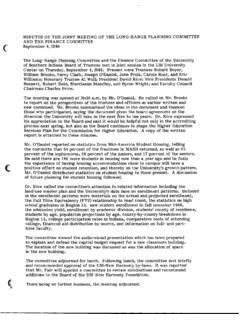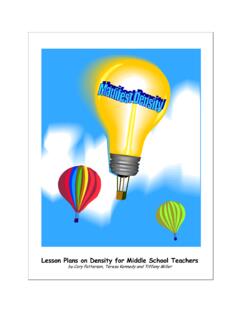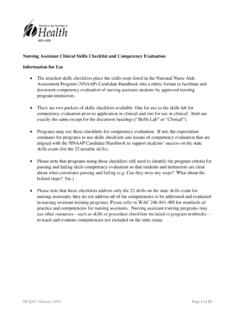Transcription of Supervising Social Work Interns
1 Supervising Social work Interns : Best Practices for Agency Field Supervisors Bonnie Rinks, LCSW, ACSW. Director of Field Education Jara Dillingham, LCSW. Professor and Field Liaison Agenda/Topics to Be Covered Mission of Field Education Orientation and Supervision Field Handbook Who's Who Student roles Why are we doing this? Supervisor roles Core Competencies Task supervisor Council on Social work When Problems arise Education 2015 Competencies Gatekeeping and Practice Behaviors Turning students into Learning Plans Professionals The Mission of Field Education In field, the focus turns from the acquisition of knowledge to the application of knowledge. students are provided with opportunities to apply the Social work knowledge and skills obtained in the classroom to actual practice situations.
2 When a student completes field he/she should be ready to enter the profession. Who's Who? Agency Field Supervisor Field Liaison/. BSW & MSW. & students Seminar Instructor Task instructor Agency intern University Faculty Why are we doing this? CSWE has new Competencies! Demands of Agency Supervisors Munson(2002) indicates that few supervisors are JUST supervisors. Rather they balance the demands of agencies, clients and requirements of the field with the needs of students or supervisees. Eliminate Stress We hope this training helps clarify expectations, and eliminate some of the stress associated with field education. Learn to be Social Workers This involves Help them creating learn to be learning Social Workers! opportunities Not just do a for students to particular job integrate or work in a theory and particular practice.
3 Agency. The Agency Field Supervisors assist students in applying the core competencies, Social work knowledge, values, and skills they have learned in class to an agency (or practice) setting Council on Social work Education 2015 Core Competencies 2015 CSWE Field Education Signature pedagogies are elements of instruction and of socialization that teach future practitioners the fundamental dimensions of professional work in their discipline to think, to preform, and to act ethically and with integrity . The intent of field education is to integrate the theoretical and conceptual contribution of the classroom with the practical world of the practice setting . Field Education is designed, supervised, coordinated and evaluated based on criteria which students demonstrate the Social work Core Competencies.
4 2015 Core Competencies of Social work Education Competency 1: Demonstrate Competency 6: Engage with Ethical and Professional Behavior Individuals, Families, Groups, Organizations, and Communities Competency 2: Engage Diversity and Difference in Practice Competency 7: Assess Individuals, Families, Groups, Organizations, Competency 3: Advance Human and Communities Rights and Social , Economic, and Environmental Justice Competency 8: Intervene with Individuals, Families, Groups, Competency 4: Engage In Practice- Organizations, and Communities informed Research and Research- informed Practice Competency 9: Evaluate Practice with Individuals, Families, Groups, Competency 5: Engage in Policy Organizations, and Communities Practice CSWE 2015 Core Competencies (page 7-9).
5 2015 Core Competencies with integrated behaviors (examples). 2) Engage Diversity and Difference in Practice apply and communicate understanding of the importance of diversity and difference in shaping life experiences in practice at the micro, mezzo, and macro levels;. present themselves as learners and engage clients and constituencies as experts of their own experiences;. apply self-awareness and self-regulation to manage the influence of personal biases and values in working with diverse clients and constituencies. 5) Engage in Policy Practice Identify Social policy at the local, state, and federal level that impacts well-being, service delivery, and access to Social services;. assess how Social welfare and economic policies impact the delivery of and access to Social services.
6 Apply critical thinking to analyze, formulate, and advocate for policies that advance human rights and Social , economic, and environmental justice Student Learning Plan (SLP) example How is the # 5 Engage in Policy Practice student going to demonstrate Identify Social policy at the local, state, and they have federal level that impacts well-being, service mastered the delivery, and access to Social services;. competencies The student has to identify how they are going of our to meet this competency while in the agency profession? students will write specific activities for each practice behavior How to Grade Interns 1 2 3 4 5 N/A. Unacceptable Developing Acceptable Commendable Exceptional The intern has The intern has The intern has The intern is The intern has Not not met the not as yet met met their functioning above excelled in this applicable, expectations in their learning learning plan their learning plan area above & as the this area, and plan expectations expectations in expectations in beyond any opportunity RUBRIC.
7 Appears in this area, but this area this area expectations of to unmotivated to appears a beginning- demonstrate make changes motivated to level Social competence that would meet continue to focus worker in this area their learning and likely will was not plan meet the available expectations in expectations the near future within the timeframe of this placement Grades Your intern is learning to apply the knowledge and skills he/she acquired in the classroom, therefore we expect to see 2's & 3's. It is simply a Snapshot of where the intern is, at the time of evaluation. A 5 does not mean an A . A 5 would mean that the intern is ready to be one of your co-workers without any additional instruction or practice. Grades The Faculty Field Liaison has the responsibility of assigning the grade for the course.
8 The grade that is assigned will be based on: intern logs ethical and professional behavior Synthesizing course work and practice (seminar participation, assigned papers, as well as other assignments). the faculty supervisor's overall evaluation of the student's performance in placement in conjunction with the Agency Field Supervisor's evaluation (your input is valuable and desired). Generalist: BSW I & II and MSW I. Generalist practice is broadly The parameters for practice are defined. usually determined by the identified client needs, the mission and function This foundation field placement is of the agency, and level of training designed so that students can and skill of the student. He/she works demonstrate the Core under supervision and relates to the Competencies at the generalist level client and delivers services in ways of Social work practice.
9 Which convey respect while honoring and promoting the dignity of the Social work roles typical of generalist clients served. practice include: case manager, advocate, broker, educator, Skills expected include the ability to community organizer, group worker communicate empathy, and individual counselor. genuineness, and a positive regard when listening and interviewing, and Assigned tasks often include the ability to utilize the planned preparing psychosocial histories, change process and problem solving developing service plans and strategies in all phases of work with implementing broad based the client: engagement, assessment, interventions congruent with the intervention, and evaluation. multi-variant client needs. Advanced: MSW II ( clinical ).
10 All MSW students complete an advanced field The advanced practicum is grounded in the practicum. liberal arts, the generalist foundation, and the values that distinguish Social work as a The advanced clinical placement provides profession. agency based opportunities for clinical Social work practice. The educational focus in the The clinical practicum is advanced, reflecting advanced practicum is in providing students the specialized knowledge, skills, and values of with opportunities to demonstrate the Core an advanced practitioner whose training which Competencies at the advanced level of Social is both specialized and rigorous in its demands work practice. for practice grounded in sound science, technical skill and the art of therapeutic Typically field agencies offer programs in practice.
















